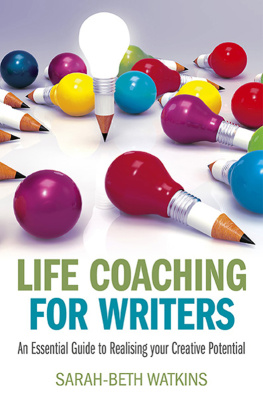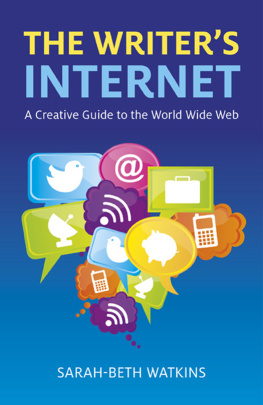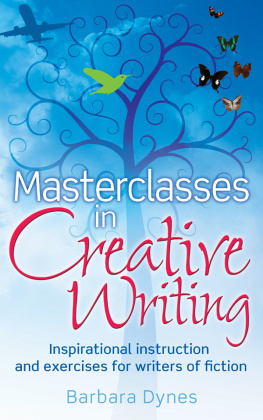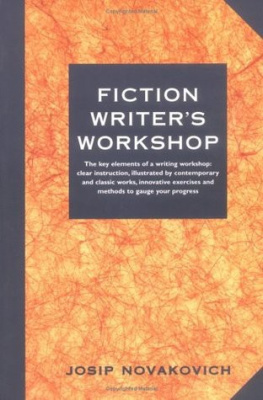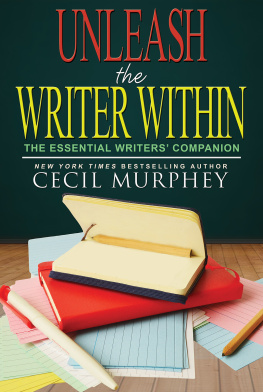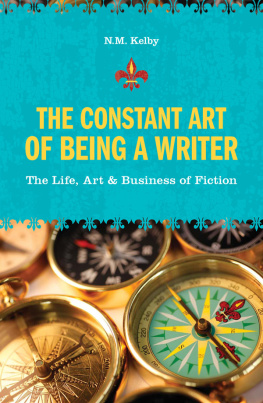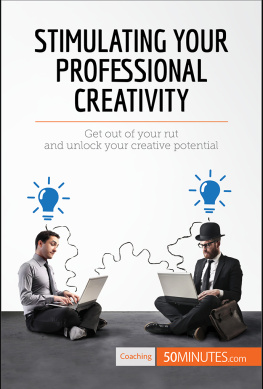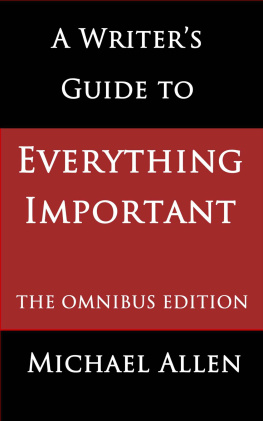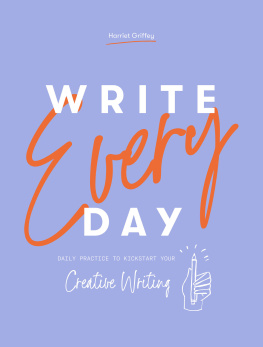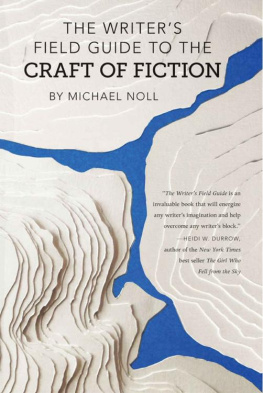First published by Compass Books, 2014
Compass Books is an imprint of John Hunt Publishing Ltd., Laurel House, Station Approach,
Alresford, Hants, SO24 9JH, UK
www.johnhuntpublishing.com
www.compass-books.net
For distributor details and how to order please visit the Ordering section on our website.
Text copyright: Sarah-Beth Watkins 2013
ISBN: 978 1 78279 239 0
All rights reserved. Except for brief quotations in critical articles or reviews, no part of this book may be reproduced in any manner without prior written permission from the publishers.
The rights of Sarah-Beth Watkins as author have been asserted in accordance with the Copyright, Designs and Patents Act 1988.
A CIP catalogue record for this book is available from the British Library.
Design: Stuart Davies
www.stuartdaviesart.com
Printed and bound by CPI Group (UK) Ltd, Croydon, CR0 4YY
We operate a distinctive and ethical publishing philosophy in all areas of our business, from our global network of authors to production and worldwide distribution.
Chapter 1
The Write Focus
When I was at school, I wanted to be a librarian. I did my work experience in the local library and I just loved being surrounded by books on a daily basis. The career guidance teacher told me I would have to spend at least four years at university to follow my dream. Well thats not happening, I told her, I need a job not more education.
I never once linked my love of books to thinking of writing as a career path. My Granddad was always telling me I had a great imagination and I should be writing books but at sixteen, all I was writing was my diary. I still have it and believe me, thats something that will never see an editors table.
It might not have occurred to me because I didnt spend much time in my English classes. I was always out in the corridor, sent out for talking too much, and awaiting the wrath of the Headmaster who got so used to seeing me there, he just used to shake his head and walk on. I wasnt bad at English, I just wasnt very good and I know Im not the only one.
Simon Whaley, author of The Positively Productive Writer, says in the introduction of his book, Do I have a degree in writing? No. Did I get a good grade in my English O level? No (I scraped through with a C grade, which in those days was the lowest pass.)
So it seems that not all writers start out with any inkling that they are going to be writers and the school system isnt a true reflection of a writers skills which of course is good news to all those writers out there that arent too proud of their English grades.
But somewhere along the line, I decided that writing was what I really wanted to do. I wanted to write articles, books, novels anything and everything but I didnt know where to start and I didnt know what to focus on.
As a life and creativity coach, I see this problem come up time and time again for writers who want to make writing a career choice and not just beginners; writers who want to try a new genre, writers who are trying to escape a day job, writers who are making a living but want to write something completely different. I found life coaching a great way of helping me to focus on my own writing as well as helping others to focus on theirs.
How Can Life Coaching Help Me as a Writer?
Life coaching is about finding your focus, delving deep within yourself to find out where you want to go with your life and seeing what needs to change in order for you to fulfil your lifes dreams. It looks at where you are in the present and where you want to be in the future. Its a journey of self-discovery with achievable goals manifested. Life coaching looks at your life in a holistic way and helps you to plan for success and to build your life around your goals.
Coaching can help you to be a better writer. Not because its going to wave a wand over your creative skills and instantly give you the best literary skills in the country but because it will help you to clear out the clutter, get rid of unwanted negative thoughts and free you up to concentrate on the writing that is important to you, the writing that you want to focus on.
Coaching has its roots in enabling sports trainers to encourage their students to perform better. Creativity coaching is a relatively new field that helps writers and other creative people to move forward on their chosen path. Its not therapy or counselling but a way of assessing yourself in the present and moving yourself towards a positive future. Of course, there are many life coaches and creativity coaches that can help you as a client but you can also coach yourself with the many tips and exercises that this book contains. Well look at life coaching, neuro-linguistic programming (NLP) and cognitive behavioural therapy (CBT) techniques that can really help you and your writing ambitions.
The Creative Juggler
Writers are jugglers. They have thoughts about new projects, half finished pieces of work, research to do and publishers to talk to about proposals. From having original ideas to selling them to the appropriate marketplace, there is a lot going on in a writers life.
And this is as well as the everyday stuff that has to be dealt with. Not everyone can be creative all of the time. Writers may have a day job that takes time and energy, children that need their love and attention or elderly relatives that need care. Life throws up obstacles and challenges that we have to face and moments when we doubt ourselves and our writing abilities. It all conspires against a writing career but thats where life coaching can help.
The trick is to make time for your writing regardless of all the other demands in your life. This can be hard to do if you dont have a focus. If you just think Ill spend a couple of hours on Saturday morning doing my creative thing but you dont specify to yourself what that is, you might spend the hour thinking of a short story you could start on, a screenplay that you feel would be just the thing directors are looking for or some research you could do for a new book but you wont actually get started. You wont knuckle down to your creative work and before you know it your time has gone with nothing to show for it.
Your Creative Purpose
One of the best ways to achieve your creative goal is to focus your mind with a creative purpose visualisation. This will help you to hone in on what you really want to do. You can do this at any stage in your writing career but it is especially useful when you are in between writing projects and arent sure what to focus on next.
Pick a quiet time when you can relax without interruption. Turn off the phone, close the door and sit in a comfortable position or if you prefer, find a space outside where you feel peaceful and can concentrate without distraction.
Close your eyes and imagine yourself in a very plush hotel. You have been asked to attend a prestigious award-giving event. You are sitting with friends and family right at the front, waiting for someone to come to the podium. When they do, they announce the main award. As everyone starts applauding, the award winner comes to the podium. It is you in the future!
Let your mind imagine what you say next as you give your acceptance speech.
What is the award for?
What have you achieved?
How does this make you feel?
Feel yourself accepting the award, thanking the people who have come here especially to see you and absorb your accomplishment for a few moments.

